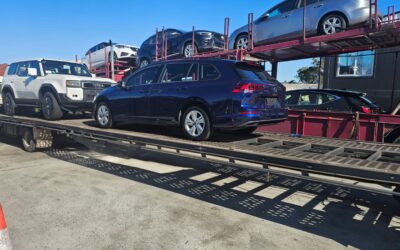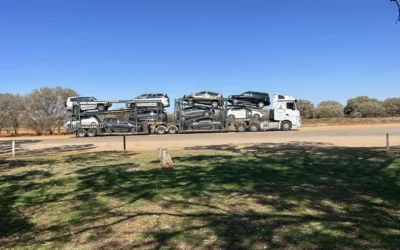When most people think of tow trucks, the first image that pops into their mind is usually a broken-down car being hauled away after a roadside breakdown. While that scenario does happen often, it barely scratches the surface of what tow trucks and professional towing services really do. Unfortunately, over time, a number of myths and misconceptions about tow trucks have taken root, leaving drivers with a skewed or negative impression of the industry.
At Unicorn Car Transport, we believe that clearing up these misconceptions not only helps drivers understand the value of professional towing but also highlights the importance of safety and expertise when it comes to handling vehicles. Let’s break down some of the most common myths about tow trucks and reveal the truth behind them.
Misconception 1: Tow Trucks Only Move Broken Cars
One of the biggest myths is that tow trucks are just for stranded vehicles. While helping out during breakdowns is part of the job, it’s far from the only service they provide. Tow trucks are also used for:
- Transporting brand-new vehicles to dealerships
- Moving luxury or classic cars that shouldn’t rack up extra kilometres
- Assisting in long-distance relocations
- Recovering vehicles from accident sites
- Helping with heavy-duty hauling, such as buses or trucks
In short, tow trucks are versatile machines designed to handle a wide variety of transport needs—not just the unfortunate flat tyre or overheated engine on the highway.
Misconception 2: Towing Damages Your Car
This misconception probably comes from the old days when cars were lifted from the front or back with chains. Modern tow trucks, however, use advanced equipment and technology designed to protect vehicles during transport. For example:
- Flatbed tow trucks carry the entire vehicle on the platform, eliminating road contact altogether.
- Wheel-lift tow trucks lift the car by its tyres, not the frame, avoiding damage to bumpers or bodywork.
- Professional operators are trained to use the right towing method for each type of vehicle, whether it’s a small hatchback, a luxury sedan, or an SUV.
When done correctly by a skilled professional, towing is completely safe and won’t harm your car.
Misconception 3: Tow Trucks Only Show Up When You’re in Trouble
Many people assume they’ll only ever interact with a tow truck during a stressful situation, like an accident or breakdown. But towing services can actually be planned and booked in advance. For instance, if you’re relocating across cities or want to move a vehicle without driving it, you can schedule a tow or transport service at your convenience.
At Unicorn Car Transport, for example, we often help customers move cars for long-distance relocations, seasonal moves, or even to safely transport classic cars to exhibitions. Far from being a “last resort,” tow trucks are an essential tool for planned, safe, and efficient car transport.
Misconception 4: Tow Truck Drivers Are Just “Hook and Go” Workers
This one couldn’t be further from the truth. Towing is a skilled profession that requires training, certifications, and a deep understanding of safety protocols. Drivers must learn how to operate complex equipment, secure vehicles of all shapes and sizes, and handle situations that could involve traffic hazards or distressed drivers.
In addition, many tow truck operators undergo training in accident recovery, winching, and even roadside assistance, such as jump-starts and tyre changes. Far from being a simple job, towing is a career built on expertise, responsibility, and a commitment to safety.
Misconception 5: Tow Trucks Take Forever to Arrive
We’ve all heard stories of someone waiting “hours” for a tow truck to arrive. While delays can happen—especially in remote areas or during peak traffic—professional towing services make it a priority to reach customers quickly.
Modern tow companies often use GPS and digital dispatch systems to track vehicles and assign the closest available truck. This reduces wait times and ensures that help arrives as soon as possible. Reliable providers like Unicorn Car Transport put efficiency at the forefront, because we know that waiting on the roadside can be stressful and dangerous.
Misconception 6: All Tow Trucks Are the Same
Just as cars come in different types, so do tow trucks. There are:
- Flatbeds – Ideal for long-distance and damage-free transport
- Hook and chain – Rarely used today due to potential damage, but still an option for scrap vehicles
- Wheel-lifts – Great for quick and efficient towing
- Heavy-duty wreckers – Built to handle buses, trucks, and machinery
Each type of tow truck serves a specific purpose, which means choosing the right service matters. This variety is what makes professional towing companies versatile enough to handle everything from a compact car to a massive commercial vehicle.
Misconception 7: Towing Is Overpriced
Another common belief is that towing is unreasonably expensive. In reality, pricing reflects the equipment, expertise, and safety measures involved. A tow isn’t just about moving a car—it’s about ensuring it’s handled with care, secured properly, and transported without further damage.
Additionally, consider the cost of not using a tow truck: attempting a DIY tow with the wrong equipment can result in accidents, car damage, or even injuries—ultimately costing much more than a professional service.
Final Thoughts
Tow trucks are far more than just emergency vehicles for breakdowns. They’re an essential part of keeping roads safe, transporting vehicles securely, and supporting drivers in both planned and unplanned situations. By clearing up these misconceptions, drivers can better appreciate the skill, safety, and professionalism behind every tow.
At Unicorn Car Transport, we take pride in offering reliable, safe, and customer-focused towing and transport services. The next time you see a tow truck on the road, you’ll know it’s not just there to haul away a broken-down car—it’s part of a bigger picture of keeping vehicles and drivers moving safely.


